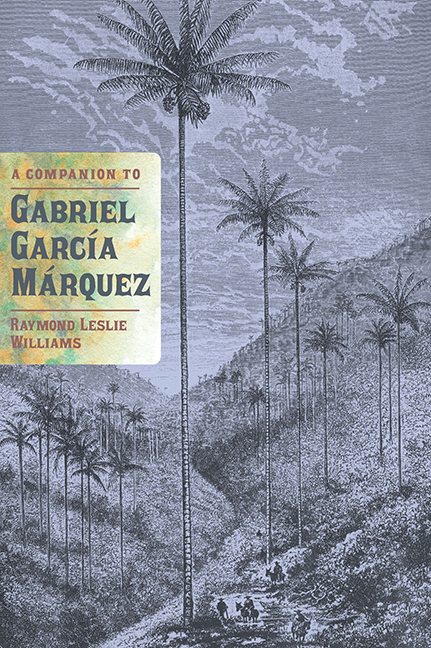Book contents
- Frontmatter
- Dedication
- Contents
- Abbreviations
- Foreword
- 1 García Márquez, the Modernists, and the Boom
- 2 Cien años de soledad and the Macondo Cycle
- 3 El otoño del patriarca and the Political Writings
- 4 Postmodern Gestures: El amor en los tiempos del cólera, Crónica de una muerte anunciada, and La increíble y triste historia de la cándida Eréndira y de su abuela desalmada
- 5 Recent Writing
- 6 Epilogue
- Guide to Further Reading
- Select Bibliography
- Index
4 - Postmodern Gestures: El amor en los tiempos del cólera, Crónica de una muerte anunciada, and La increíble y triste historia de la cándida Eréndira y de su abuela desalmada
Published online by Cambridge University Press: 26 May 2022
- Frontmatter
- Dedication
- Contents
- Abbreviations
- Foreword
- 1 García Márquez, the Modernists, and the Boom
- 2 Cien años de soledad and the Macondo Cycle
- 3 El otoño del patriarca and the Political Writings
- 4 Postmodern Gestures: El amor en los tiempos del cólera, Crónica de una muerte anunciada, and La increíble y triste historia de la cándida Eréndira y de su abuela desalmada
- 5 Recent Writing
- 6 Epilogue
- Guide to Further Reading
- Select Bibliography
- Index
Summary
On completion of the work in the Macondo cycle that has come to be recognized as the best of them (his signature Macondo story), Cien años de soledad, and after its publication, García Márquez decided to change the direction of his work. In Cien años and his short novels La hojarasca, La mala hora and El coronel no tiene quién le escriba, as well as the short stories of Los funerales de la mamá grande, García Márquez had told the story of Macondo, and now he was ready to begin a new stage of his writing career. As a writer with cosmopolitan and modernist interests, he left behind the characters and the unique world of Macondo. He launched this new stage with the publication of El otoño del patriarca in 1975, the most explicitly political of his novels and also the most disassociated from Macondo. Scholars and critics immediately noted that the author of El otoño had abandoned not only Macondo and its characters, but also many of the trademark gestures (above all, the fantasy) previously associated with his supposed ‘magic realism’.
In his next novels, Crónica de una muerte anunciada and El amor en los tiempos del cólera, García Márquez's writing seemed to take a postmodern turn, for these are what are sometimes called self-reflective texts (that is, they contain internal comment or allusions to fiction in general) and that is something we find in postmodern fiction. Indeed, they are a technical tour de force in the art of storytelling, both of them examples of a writer at the height of his powers as a novelist. The complexity of García Márquez's work, however, precludes the reduction of these texts to mere postmodern exercises. Though they are postmodern tours de force and what are often termed hermeneutic tales (stories, that is, that invite multiple interpretations), they are also a continuation of his modernist project of exploring the Hispanic and African historical roots of Latin American society, as well as a return to some of the now standard fare of his Macondo fiction. These two novels, El amor and Crónica, as well as selected short stories of La increíble triste historia de la cándida Eréndira y de su abuela desalmada, will be the focus of this chapter.
- Type
- Chapter
- Information
- A Companion to Gabriel García Márquez , pp. 101 - 126Publisher: Boydell & BrewerPrint publication year: 2021



